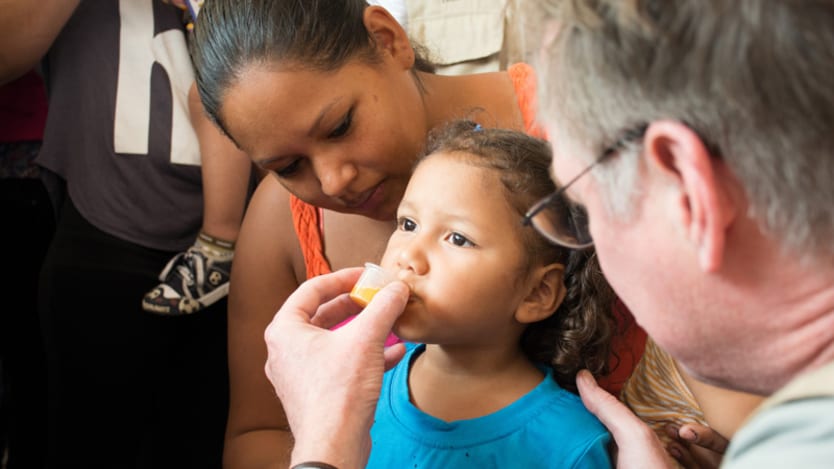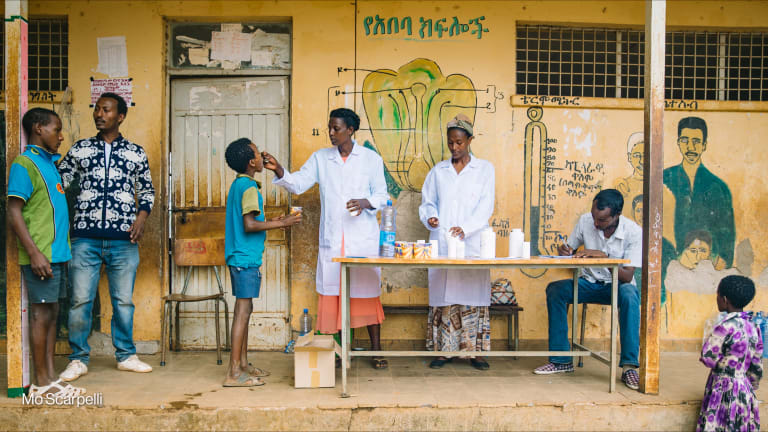
If you want to go fast, go alone. If you want to go far, go together.
This familiar African proverb is well-known in global public health circles. It speaks to the sustaining power of partnerships and teamwork and the gains that can be made when organizations and governments collaborate. It also speaks to a need for patience and mutual understanding if we want to achieve our shared goals.
The progress tackling the problem of intestinal worms — also known as soil-transmitted helminthiasis, or STH — is an example that brings this proverb to life.
STH is caused by roundworms, hookworms and whipworms that live in the human intestine. They thrive in some 100 countries where sanitation is inadequate and access to clean water is limited. According to the World Health Organization, one in six people is at risk of STH and requires periodic deworming. Many of them are schoolchildren, for whom STH causes long-term damage. While usually not fatal, STH contributes to poor nutrition, stunting, anemia, impaired learning and reduced lifetime earning potential — all of which keep people entrenched in a cycle of poverty.
Collaboration to control STH has never been greater. Four years ago, a diverse group of leaders in global public health came together in London to endorse and support The London Declaration to fight Neglected Tropical Diseases. The London Declaration drove an unprecedented and much-needed infusion of resources — including funding, medicine, research and program development — to address the overwhelming disease burden of STH and nine other neglected tropical diseases. The effort to control STH gained even more momentum two years ago, when several donors committed funds and announced the creation of the STH Coalition, now an alliance of more than 50 public and private partners dedicated to keeping children free from intestinal worms.
More and more national governments have established country-wide STH control policies and programs, utilizing medicine donated by pharmaceutical companies to treat worm infections and building the infrastructure needed to deliver these medicines and to improve sanitation and hygiene. For example, this February, India embarked on a significant public health endeavor aimed to reach more than 270 million children with deworming medicines. Similarly, Bangladesh’s government redoubled its efforts to eliminate STH as a public health problem and is expanding its school-based deworming program to include at-risk children in secondary schools.
This enhanced collaboration is exactly what’s needed to bring the scourge of intestinal worms under control once and for all. It has sharpened our vision of what is possible and our understanding of how to achieve this goal. Efforts to listen carefully to each other and develop solid working relationships have been more than rewarded by the momentum tackling STH.
By committing to go far together, we also have a new appreciation for the value of intensified program monitoring. Data will help us make crucial program decisions and inform us of progress toward our common goal. We need good data that allow all members of the public health community to see where greatest risk of STH remains, which segments of the population still need to be treated, and how often these treatments are needed.
There are three things we can do to help demand and generate good data:
Clarify national-level goals, which can range from controlling diseases in school-age children to interrupting transmission of the parasites.
Establish robust monitoring and reporting systems to assess progress toward national goals.
Mobilize national-level coalitions and public-private partnerships to ensure coordinated data collection and reporting.
Such data will also optimize and refine the collaboration among public and private partners. With good data to inform decision making, national programs and STH Coalition partners can work toward the World Health Organization’s goal of eliminating STH as a public health problem. In turn, this will improve the chance for millions to live healthy, productive lives.
Join the Devex community and access more in-depth analysis, breaking news and business advice — and a host of other services — on international development, humanitarian aid and global health.








